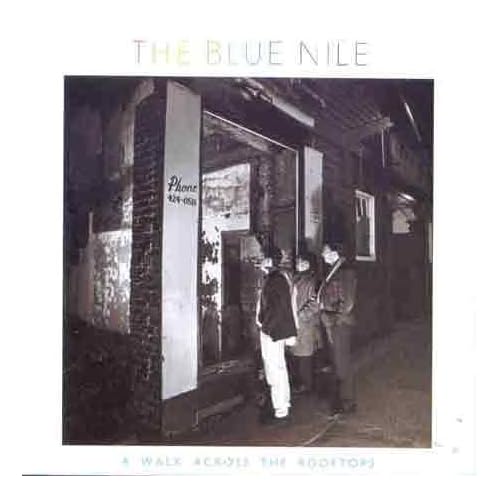In May 1984, The Blue Nile released their First album, A Walk Across The Rooftops
 It was originally created as a commission for top-end hi-fi firm Linn. They wanted a demonstration record containing a good range of dynamics and with clear and shimmering production. The band produced an L.P. which was so good that Linn formed a record label and paid for the album to be released. Rooftops was not a big seller, but was very well reviewed and quickly gained fans of the stature of Peter Gabriel, Rickie-Lee Jones and Annie Lennox. Today it stands up as a classic album in its own right.
It was originally created as a commission for top-end hi-fi firm Linn. They wanted a demonstration record containing a good range of dynamics and with clear and shimmering production. The band produced an L.P. which was so good that Linn formed a record label and paid for the album to be released. Rooftops was not a big seller, but was very well reviewed and quickly gained fans of the stature of Peter Gabriel, Rickie-Lee Jones and Annie Lennox. Today it stands up as a classic album in its own right.I was unaware of this album until Hats was released in 1989. This, their second album was a fair seller, though not a hit by any means, but it got even better reviews than the debut. As soon as I read the five-star reviews of Hats, I bought it, and the earlier work. I've never regretted that decision.
All the songs on this album need to be experienced on a good pair of headphones to really appreciate them.
A Walk Across the Rooftops
The opening track fades in slowly from nowhere with ethereal drones and synthesized machine noises. Drums, stabbing strings and a throbbing bass riff introduce a delightful song. From the point-of-view of a love-struck man prowling around a city's roofs in the middle of the night. Just before dawn is the feeling that you get from the track. Soon the world will wake up to the new day.
Tinseltown in the Rain
A scratchy, funky bass and guitar rhythm backed with a distant piano introduce a pacy song which the writer's tribute to (I'm guessing here) nights spent out with friends and lovers in Glasgow. Whooping synthesized horn sounds punctuate the story and lush strings erupt at the choruses. The scratchy guitar breaks out into a frenetic rhythm solo in the middle-eight. When singing "do I love you? Yes, I love you", Paul Buchanan's voice erupts with passion and joy.
From Rags to Riches
A percussive opening; like a gamelan orchestra. Soon deep bass and soothing synth pads take their place among a complex weaving arrangement which includes simple, reverb-laden drums. The song seems to describe the journey of a young man leaving home for the first time to make his way in the world, wondering whether his life will be a success. The breathless sounds and urgent parping horns seem to say that life will present challenges but that the journey is worthwhile.
Stay
One of my favourite Blue Nile songs. A sequenced synthesizer riff over metronomic drums drives the song quickly onward, but what could seem mechanical is undercut by beautiful piano and guitar work bringing a humanity to the piece. As with most Blue Nile songs you hear more layers to the production each time you listen.
Easter Parade
Taking its title from the old film, this is a gorgeous, elegaic song featuring mainly piano, but with occasional, subtle stabs of punctuating synth sounds. Beats me what the lyrics are about. The final verse ("In hallways and railway stations. Radio across the morning air. A crowd of people everywhere") gives me the impression that this is about a big news event. The death of Kennedy or John Lennon? But neither of those were at Easter. Well, it's a mystery to me, but a fantastically, beautiful song nonetheless. The Blue Nile revisited this song in a track on their 1990 single Headlights on the Parade. That new version of Easter Parade featured Rickie Lee Jones singing alongside Paul Buchanan. It's even better than this version!
Heatwave
More synthesized mechanical noises here, though at times they sound like the sounds of the countryside: shepherds whistle, woodsmen cut wood, farm machinery. More gamelan-type percussion undercuts a serene, laid-back evocation of a summer scene. A simple acoustic guitar figure picks out a counter-melody during the chorus. Again, this is deceptively simple, but packed-full of details all the way through (for the first time in 20 years I've just picked out a harp panning its way through the track!).
Automobile Noise
A big bass drum introduces this track. But the percussion soon becomes complex. Various metallic noises (one suspects from car parts) punctuate the whole of this track, along with barely discernible tyre sounds, rain and thunderstorms, providing the backing for the chiming music and lyrics which talk of the constant movement of traffic. The noise calms towards the end of the track though and you get the impression of the traffic lessening, perhaps as night draws on, bringing us full circle back to the start of the album.
All songs written by Paul Buchanan.
Robert Bell - Bass, Synthesizer.
Paul Buchanan - Vocals, Guitar, Synthesizer.
Paul Joseph Moore - Keyboards, Synthesizer.
Calum Malcolm - Keyboards, Vocals.
Nigel Thomas - Drums.
Produced by The Blue Nile.
Engineer: Calum Malcolm.
Recorded at Castlesound Studio, East Lothian, 1982-1984.